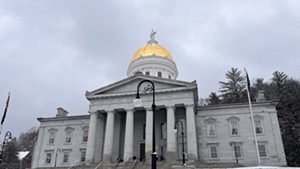
- Anne Wallace Allen ©️ Seven Days
- Emilie Kornheiser at home in Brattleboro
The person leading the class struggle in the Vermont Statehouse this year, Rep. Emilie Kornheiser, lives in a rented farmhouse with no mobile phone signal and sketchy WiFi. Her landlord's goats graze across the driveway. A trip to town involves a narrow dirt road.
During the legislative session, Kornheiser, a Democrat from Brattleboro, leaves this woodsy idyll at dawn for the two-hour drive to Montpelier. There she throws herself into some of the state's most contentious issues as chair of the powerful House Ways and Means Committee, the panel tasked with finding ways to pay for state government to work. In the end, that usually means taxes.
Tax policy has dominated the legislative session, and for months, the focus has been on Kornheiser. She's chaired Ways and Means for barely a year but made a name for herself by calling upon the rich to pay more in order to, as she views it, help poor and middle-class Vermonters lead better lives.
That has meant proposing tax increases, an approach that has proved popular among many Progressives and Democrats who want to close the growing divide between Vermont's wealthy residents and everybody else. Lined up on the opposing side are business groups, individuals, conservatives and the administration of Gov. Phil Scott, a Republican, who argue that her proposals would slow Vermont's already torpid economic growth. Making Vermont affordable is a policy priority for Scott, and he argues that taxes are too high as it is.
Already this year, expected property tax increases have produced a fierce voter backlash. In 2022, Kornheiser helped draft Act 127, a law that steers more state aid to districts teaching disadvantaged students. The law was meant to enable some districts to offer more services without raising property taxes, but many people now say the law had the opposite effect: incentivizing lower-income school districts to spend more.
That has contributed to projected potential tax increases approaching 20 percent in some school districts. On Town Meeting Day, Vermont voters rejected approximately a third of the school budgets that were up for a vote. Since then, budgets have failed a second time in 12 school districts. More revotes are planned in coming weeks.
Kornheiser has apologized for the property tax imbroglio, saying she didn't anticipate the sharp increases. But she remains unwavering in her view that more government services will improve life for struggling low-income and middle-class Vermonters. As a single mother who once received state assistance and help from her parents to get by, Kornheiser said government doesn't work as it should because its resources are too limited. When she worked as a case manager for a state Department for Children and Families program called Reach Up, Kornheiser recalled, coworkers relied on food stamps because the program couldn't afford to pay them enough to make ends meet.
"The path to making government work is that government has enough money," she said.
To raise that money, Ways and Means this year voted out bills with a host of new taxes aimed mainly at the wealthy: H.829 contains a 3 percent income tax surcharge on households with annual income over $500,000 and would also increase the property transfer tax for homes worth more than $750,000; H.887, passed by the full House on Tuesday, includes a plan to tax cloud-based software and short-term rentals, which would raise revenue to help keep property taxes from rising as quickly as forecasted.
Republicans held a press conference last Thursday objecting to H.887, saying the bill was little more than an attempt to address the property tax debacle by raising other taxes; the bill aims to keep the property tax increases at about 15 percent for most homeowners.
The House has also passed H.721 and H.880, which would increase corporate taxes.
Last year, Kornheiser's panel backed a 3-cent property tax increase to provide meals to every public school student, regardless of income, as well as a payroll tax — effective in July — that will raise an estimated $120 million annually for childcare aid.
Billions in federal pandemic dollars have run out, darkening Vermont's financial outlook, and lawmakers are facing the first budget decrease in a decade. Gov. Scott has repeatedly urged lawmakers not to raise spending and in late March warned that the tax increases proposed by the House would make Vermont "the highest taxed corporate state in America, not a great marketing strategy to attract businesses to our state."
Many political insiders have pinned responsibility for the potential tax hikes squarely on Kornheiser, the sole sponsor of the wealth tax. Scott and many others are pushing back hard on her proposals, and it's unclear how they'll fare in the Senate.
"They are turning this place into a country club economy for the super-wealthy and those who serve them," said Rob Roper, a former longtime president of the conservative Ethan Allen Institute, who described Kornheiser as "an extreme socialist in the Bernie Sanders sense of the word."
Others agreed to talk about Kornheiser and taxes only if they could do so anonymously. Few people who labor in the trenches of state policy want to risk ruffling feathers on Ways and Means.
Kornheiser has plenty of loyal friends and supporters, among them U.S. Rep. Becca Balint (D-Vt.), a former Vermont state senator who shared the long drive to the Statehouse with her for four years. They discussed policy a lot, along with books and poetry. Kornheiser, Balint said, is a loving and supportive friend but can rub people the wrong way on issues she deems imperatives. "She is really interested in passing good policy, and in the process of doing that, she wants to get people to work together," Balint said, "but she isn't particularly motivated by whether people like her."
Tax opponents who are accustomed to facing down Kornheiser in her committee say they are often caught short by her directness and detached demeanor, which can come across as rude. One lobbyist described her as "mean." In an interview, Kornheiser wondered aloud if she might be autistic. In any case, she is fond of saying that she finds opposing viewpoints edifying.
"I am more comfortable disagreeing and being disagreed with than I think a lot of people are," she said.
Kornheiser, 45, traveled a winding road to the top seat at Ways and Means. She described a childhood spent playing alone in the woods and reading a lot in suburban Chappaqua, N.Y. "I didn't understand the social nuance of what was happening in school at all," she said. "My teachers liked me."
Things went awry in high school. "I thought everything was bullshit," Kornheiser recalled. She hung out with "a cute crew of other reprobates," she said, and got arrested for possession of a drug — which one, she said, she doesn't remember. Her parents kicked her out, and she moved in with a friend.
She found her way to the now defunct Marlboro College in southern Vermont, where she planned to study poetry and painting but was soon captivated by sociology and Karl Marx. She studied the way communities treat their most vulnerable residents and developed a commitment to social justice.
Kornheiser graduated with a bachelor's degree in sociology, knowing she wanted to make a difference. She wasn't sure how but knew it would involve redistributing money from the rich to the poor.
She started a short-lived restaurant, Weathervane Gallery and Performing Arts Café in Brattleboro, with her then-partner. The 26-year-old single mom, who declared bankruptcy after the café went out of business, relied on friends, neighbors and state benefits as she adjusted to life with a newborn in a downtown Brattleboro apartment.
Kornheiser earned a master's degree in public policy, community development and economics from the University of Vermont in 2009 and later ended up back in Brattleboro. She staffed the front desk at the local economic services office of the state Department for Children and Families, helping others navigate the paperwork needed to receive state benefits.
Software glitches stalled applications while clients struggled with forms. A functional government, she concluded, should do better.
She went on to launch a consulting business called Equity Solutions that works with nonprofits — she declined to say which ones — and volunteered on town committees, the board of the Brattleboro Food Coop and the Windham County Action Network.
While showing a reporter around Brattleboro, Kornheiser displayed a warmth that she typically doesn't in the halls of the Statehouse. She described with affection some of the town's large affordable housing projects and reminisced about people she met while campaigning in the huge Tri-Park mobile home park, the largest in Vermont. She met the owner of a house that once sported signs supporting both Trump and Kornheiser.
"They trusted me, and they also didn't trust the political establishment in Washington," she said.
She weaves stories about friends into her accounts of life in Brattleboro and is known for hosting big dinners for Shabbat, Passover and Rosh Hashanah — or for no reason at all, Balint said.
Kornheiser, who handily defeated incumbent representative Valerie Stuart to win office in 2018, said she felt at home in the Statehouse right away. She started out on the House Commerce and Economic Development Committee and quickly moved over to Ways and Means. With a pandemic-era exodus underway, Kornheiser rapidly rose to the position of vice chair with help from then-chair Janet Ancel, a Democrat from Calais who said she saw Kornheiser early on as a possible successor.
"She was obviously really smart and, I would say, ambitious in the right kinds of ways," Ancel said in an interview. "Not in the sense that she was looking for the next office to run for but ambitious in the sense of wanting to work really hard and make a difference."
To make that difference, Kornheiser may have to convince more of her colleagues that taxes are the answer to Vermont's inequities and economic shortcomings. The state already has some of the highest taxes in the country, according to the Tax Foundation, a research group that describes itself as nonpartisan. Adding a 3 percent wealth tax, said Rep. Scott Beck (R-St. Johnsbury), who sits on House Ways and Means, would push Vermont's income tax for high earners above the one in Massachusetts.
Talk of a wealth tax comes up every few years in the Vermont legislature. Whenever it does, some people embrace it — dozens of wealthy Vermonters, including Ben Cohen and Jerry Greenfield, signed a letter in favor of Kornheiser's proposal in March — while others predict it will only prompt the rich to exit the state, taking their charitable donations and board service with them.
Kornheiser doesn't buy that. She pointed to reports from the Joint Fiscal Office showing that wealthy people still choose to move to Vermont — and noted that in 2023, she was selected as legislator of the year by Vermont Businesses for Social Responsibility.
"People move here because they want to live in strong communities where folks take care of each other," she said.
Republican lawmaker Beck, a teacher at St. Johnsbury Academy, said he likes Kornheiser, describing her as smart and hardworking. But he said Vermont's government spending is outpacing its economic growth.
"The solution is to increase economic activity," Beck said. "We need people that have income and have wealth to come to Vermont."
Kornheiser said during an interview on April 15 — Tax Day — that property tax conversations have become increasingly difficult. But those tough discussions are what she says she is looking for.
"There's something generative about people being willing to admit they don't see eye to eye on something and then walking away with a new perspective," Kornheiser said. "Unless we talk about it, how are we ever going to figure it out?"
Correction, April 26, 2024: An earlier version of this story misstated the amount of a tax hike to pay for school meals for all students.











Comments
Comments are closed.
From 2014-2020, Seven Days allowed readers to comment on all stories posted on our website. While we've appreciated the suggestions and insights, right now Seven Days is prioritizing our core mission — producing high-quality, responsible local journalism — over moderating online debates between readers.
To criticize, correct or praise our reporting, please send us a letter to the editor or send us a tip. We’ll check it out and report the results.
Online comments may return when we have better tech tools for managing them. Thanks for reading.